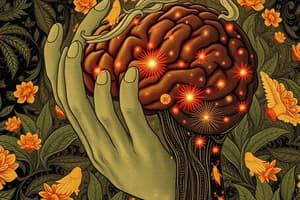Podcast
Questions and Answers
MSM posits that memory consists of three main ______: sensory register, short-term memory (STM), and long-term memory (LTM).
MSM posits that memory consists of three main ______: sensory register, short-term memory (STM), and long-term memory (LTM).
stores
Initially, sensory information undergoes processing in the ______ where it holds a substantial amount of data but for only a brief period, typically seconds.
Initially, sensory information undergoes processing in the ______ where it holds a substantial amount of data but for only a brief period, typically seconds.
sensory register
Information that receives attention moves into ______.
Information that receives attention moves into ______.
STM
The information that was effectively rehearsed in STM has the potential to be moved from STM to ______.
The information that was effectively rehearsed in STM has the potential to be moved from STM to ______.
Retrieval involves transferring information back to ______ for conscious use and awareness.
Retrieval involves transferring information back to ______ for conscious use and awareness.
A disruptive factor that hinders the focus and practice required for efficient encoding is ______.
A disruptive factor that hinders the focus and practice required for efficient encoding is ______.
An actor portrayed the role of the ______ in both videos, discussing a topic related to financial literacy.
An actor portrayed the role of the ______ in both videos, discussing a topic related to financial literacy.
In the low boredom condition, the actor was instructed to maintain an upbeat, energetic ______ and to be engaging throughout the lecture.
In the low boredom condition, the actor was instructed to maintain an upbeat, energetic ______ and to be engaging throughout the lecture.
To encourage participant engagement, the actor posed questions related to the topic at various points during the ______, allowing participants time to answer independently.
To encourage participant engagement, the actor posed questions related to the topic at various points during the ______, allowing participants time to answer independently.
The video in the boredom condition was intentionally rendered in poorer quality compared to the video in the low boredom ______.
The video in the boredom condition was intentionally rendered in poorer quality compared to the video in the low boredom ______.
It aimed to answer the following questions: a) does academic boredom predict information retention?and b) do factors such as video quality, vocal tone, and engagement tasks in an educational material contribute to an individual’s information retention?The following hypotheses was tested: H1: High levels of academic ______ will decrease information retention.
It aimed to answer the following questions: a) does academic boredom predict information retention?and b) do factors such as video quality, vocal tone, and engagement tasks in an educational material contribute to an individual’s information retention?The following hypotheses was tested: H1: High levels of academic ______ will decrease information retention.
To assess participants’ information retention, a 10-item multiple-choice questionnaire about the lecture content was ______.
To assess participants’ information retention, a 10-item multiple-choice questionnaire about the lecture content was ______.
The questions were chosen based on the findings of a pilot study conducted prior to the main ______.
The questions were chosen based on the findings of a pilot study conducted prior to the main ______.
Significance of the Study Despite the growing interest and number of studies about boredom, experts in the field still deem this subject matter as understudied and ______ (Westgate and Steidle, 2020).
Significance of the Study Despite the growing interest and number of studies about boredom, experts in the field still deem this subject matter as understudied and ______ (Westgate and Steidle, 2020).
The results of this study contributed to the body of knowledge about academic boredom by showing how information retention is affected by academic ______.
The results of this study contributed to the body of knowledge about academic boredom by showing how information retention is affected by academic ______.
Furthermore, this study sheds light and provide information that is useful, especially for those in the field of educational ______.
Furthermore, this study sheds light and provide information that is useful, especially for those in the field of educational ______.
Having the information on how the material is perceived as “boring” by audiences and its effect on their information retention can give insight into how to make appropriate materials that will sustain the interest of its ACADEMIC ______ ON INFORMATION RETENTION 18 intended audience.
Having the information on how the material is perceived as “boring” by audiences and its effect on their information retention can give insight into how to make appropriate materials that will sustain the interest of its ACADEMIC ______ ON INFORMATION RETENTION 18 intended audience.
This research focused on investigating the relationship between academic ______ and information retention among undergraduate students aged 18 to 30.
This research focused on investigating the relationship between academic ______ and information retention among undergraduate students aged 18 to 30.
Encoding is the ______ stage in which sensory information will be taken and altered into a format the brain can understand and work with.
Encoding is the ______ stage in which sensory information will be taken and altered into a format the brain can understand and work with.
The encoded information will enter the ______ stage, retain, and store the information for varying durations.
The encoded information will enter the ______ stage, retain, and store the information for varying durations.
The final stage will be ______ which involves accessing and recalling the stored information.
The final stage will be ______ which involves accessing and recalling the stored information.
According to the American Psychological Association, information retention pertains to the act of storing and preserving ______ for an extended duration.
According to the American Psychological Association, information retention pertains to the act of storing and preserving ______ for an extended duration.
Information retention may be influenced by numerous factors, including attention, the significance of the information, ______ techniques (i.e. mnemonics), testing, the presence of rewards, and motivation.
Information retention may be influenced by numerous factors, including attention, the significance of the information, ______ techniques (i.e. mnemonics), testing, the presence of rewards, and motivation.
This bridges the connection between the first (encoding) and second (______) stages of the memory process as this ensures that various information remains available for future use and retrieval.
This bridges the connection between the first (encoding) and second (______) stages of the memory process as this ensures that various information remains available for future use and retrieval.
This involved participants completing the ______ Questionnaire (MMQ) (Troyer & Rich, 2002) to screen for potential memory issues before measuring information retention.
This involved participants completing the ______ Questionnaire (MMQ) (Troyer & Rich, 2002) to screen for potential memory issues before measuring information retention.
The questionnaire comprises three independent ______: satisfaction with one's memory, memory ability, and use of memory strategies.
The questionnaire comprises three independent ______: satisfaction with one's memory, memory ability, and use of memory strategies.
The study only used the ______ satisfaction subscale.
The study only used the ______ satisfaction subscale.
Participants scoring 29 and below were ______ from the sample as this would indicate a possible issue in terms of their memory.
Participants scoring 29 and below were ______ from the sample as this would indicate a possible issue in terms of their memory.
The survey included the ______ Health Questionnaire-9 (PHQ-9) to assess participants for depressive symptoms.
The survey included the ______ Health Questionnaire-9 (PHQ-9) to assess participants for depressive symptoms.
Sun et al.(2022) reported a ______'s coefficient of 0.839 for the scale, indicating satisfactory reliability.
Sun et al.(2022) reported a ______'s coefficient of 0.839 for the scale, indicating satisfactory reliability.
Flashcards are hidden until you start studying




